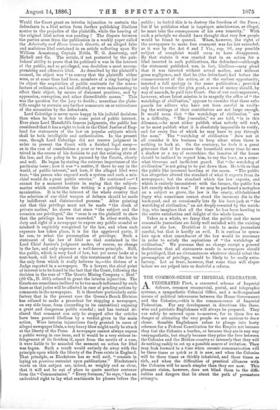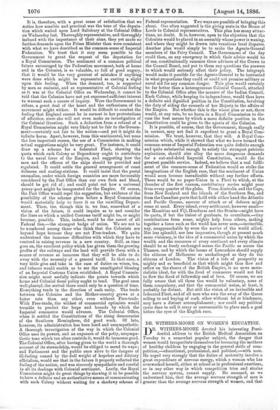THE COMMON-SENSE OF IMPERIAL FEDERATION.
AFEDERATED Fleet, a concerted scheme of Imperial defence, common commercial, postal, and telegraphic systems, a sympathetic Colonial Office, and a well-organised means of political intercourse between the Home Government and the Colonies,—this is the common-sense of Imperial Federation. For any development in directions like these, wise and patriotic Englishmen will always be prepared. They can safely be entered upon to-morrow, for in them lies no danger of alienating the very people we are anxious to draw closer. Sensible Englishmen refuse to plunge into hasty schemes for a Federal Constitution for the Empire not because they feel the Colonies a burden, or because they are in any way unsympathetic, but simply because they prize the love between the Colonies and the Mother-country so intensely that they will do nothing rashly to set up a possible source of irritation. They may look forward to a time when oceanic communication will be three times as quick as it is now, and when the Colonies will be three times as thickly inhabited, and three times as rich, and when the difficulties of practical alliances with the Colonies will be much simpler than they are now. This pleasant vision, however, does not blind them to the diffi- culties and dangers that lie about the path of premature attempts. It is, therefore, with a great sense of satisfaction that we notice how sensible and practical was the tone of the deputa- tion which waited upon Lord Salisbury at the Colonial Office on Wednesday last. Thoroughly representative, and thoroughly imbued with the importance of their aims, they yet made no further demands upon the Prime Minister than were consistent with what we have described as the common-sense of Imperial Federation. We trust that it may seem possible to the Government to grant the request of the deputation for a Royal Commission. The sentiment of a common political future encouraged by the Federation movement, both at home and in the Colonies, is so valuable, so full of good augury, that it would be the very greatest of mistakes if anything were done which might be represented as casting a slight upon this feeling. When the demand, too, is supported by men so eminent, and so representative of Colonial feeling as it was at the Colonial Office on Wednesday, it cannot be 'said that the Colonies have not yet expressed sufficient interest to warrant such a course of inquiry. Were the Government to refuse, a great deal of the heart and the enthusiasm of the movement might wither. It would be difficult to combat the feeling that England cannot be in earnest in her protestations of affection, since she will not even make an investigation of the Colonial Question. Such a deduction from a refusal of a Royal Commission might very likely not be fair to the Govern- ment—certainly not fair to the nation—and yet it might do infinite harm. Apart, however, from this sentimental, but none the less important reason, the use of a Commission in making actual suggestions might be very great. For instance, it could draw up a scheme for a federated Fleet, showing the quota which each Colony or Dependency ought to contribute to the naval force of the Empire, and suggesting how the men and the officers of the ships should be provided and regulated. It could settle the general arrangement of coast defences and coaling-stations. It could insist that the postal anomalies, under which foreign countries are more favourably considered by the Post Office than our own flesh and blood, should be got rid of ; and could point out how a universal penny-post might be inaugurated for the Empire. Of course, the Post Office would repel the suggestion, but evidence of the possibility of the scheme given before a Royal Commission would materially help to force it on the unwilling Depart- ment. Then, too, though this is, we fear, somewhat of a vision of the future, it could inquire as to and consider the lines on which a unified Customs tariff might be, or might become, possible. This, indeed, would be the surest of all Federal ties,—the strongest badge of union. We are not to be numbered among those who think that the Colonists are beyond hope because they are not Free-traders. We quite understand the immense difficulties with which they have to contend in raising revenue in a new country. Still, as time goes on, the excellent policy which has given them the growing profits of the railways and the land will provide them with a source of revenue so immense that they will be able to do away with the necessity of a general tariff. In that case, a very little give and take in the case of duties on wines, tea, and tobacco would enable us to see the unmitigated blessing of an Imperial Customs Union established. A Royal Commis- sion might most usefully indicate the points towards which home and Colonial fiscal policy ought to tend. The goal once well planted, the arrival there could only be a question of time. Everything tends in the direction of such unity. The trade between the Colonies and the Mother-country grows at a faster rate than any other, even without Free-trade. With Free-trade, the wildest of commercial optimists would tremble to predict the leaps and bounds by which the Imperial commerce would advance. The Colonial Office, when it settled the Constitutions of the rising democracies of the Southern Hemisphere, did good work. Of late, however, its administration has been hard and unsympathetic. A thorough investigation of the way in which the Colonial Office uses its powers, and an exposure of the petty, unsympa- thetic tone which too often controls it, would do immense good. The Colonial Office, after having given to the world a thorough account of its stewardship, would be obliged to mend its ways ; and Parliament and the public once alive to the dangers of ill-feeling caused by the dull weight of hopeless and dilatory officialism, would see that in the future it properly reflected the feeling of the nation, and was sincerely sympathetic and careful in all its dealings with Colonial sentiment. Lastly, the Royal Commission might do great things by showing it to be possible to have a definite and an authoritative means of communicating with each Colony without waiting for a shadowy scheme of
Federal representation. Two ways are possible of bringing this about. One often suggested is the giving seats in the House of Lords to Colonial representatives. This plan has many attrac- tions, no doubt. It is, however, open to the objection that the Colonists would bs placed in an assembly whose power is waning, and where they might be drawn into vexatious local disputes. Another plan would simply be to make the Agents-General members of the Privy Council. The Government of the day could then, on any emergency in which their advice would be of use, constitutionally summon these advisers of the Crown to the Council Board, and put to them any questions the answers to which would seriously affect their policy. The telegraph would make it possible for the Agents-General to be instructed in what proportions they could or could not promise military or naval aid for any common danger. This plan would certainly be far better than a heterogeneous Colonial Council, attached to the Colonial Office after the manner of the Indian Council.
Each Colony, while keeping its independence, would thus have a definite and dignified position in the Constitution, involving the duty of aiding the counsels of her Majesty in the affairs of the Empire. But whether this is the wisest plan or not, there would, at any rate, be no harm in a Royal Commission to dis- cuss the best means by which a more definite position in the Constitution could be given to the agents of the Colonies.
It is possible, of course, that the Government, though really in earnest, may not find it expedient to grant a Royal Com- mission. We trust, however, that they will. A Royal Com- mission which, while it showed that what we have termed the common-sense of Imperial Federation was quite definite enough and quite substantial enough to satisfy the strongest patriotic aspirations, should also allay the more dangerous demands for a cut-and-dried Imperial Constitution, would do the greatest possible service. Indeed, we believe that a real fulfil- ment of the common-sense of Federation would so strike the imaginations of the English race, that the sentiment of Union would soon become ineradicable without any further efforts.
There would be no paper-Union in a Fleet to which, at the thunder of the first cannon, contributory navies might pour from every quarter of the globe. From Australia and the Cape, from New Zealand and the islands of the Southern Sea, and from the Canadian ports that hold with either hand the Atlantic and Pacific Oceans,' succour of attack or of defence might come at need. Every island, every settlement, however small— the Mauritius and Fiji, Honduras and the Straits—might have its qudta, if but the tiniest of gunboats, to contribute,—tiny contributions from some, mighty help from others, making together a force such as the world has never seen,—invincible, nay, unapproachable by even the navies of the world allied. Not less splendid, nor less impressive, though at present much more visionary, is the idea of a commercial union by which the wealth and the resources of every continent and every climate should be as freely exchanged across the Pacific as across the Thames, and by which the looms of Lancashire should supply the citizens of Melbourne as unchallenged as they do the citizens of London. The vision of a tide of prosperity so mighty and so beneficial as that which might thus flow and reflow on the shores of the British Empire, is no mere mate- rialistic ideal, for with the flood of commerce would not fail to flow the flood of fellowship and of love. Of course, we are fully aware that all these ties would be voluntary, none of them compulsory, and that the commercial union, at least, is probably far distant. But still the vision of an invincible and federated Fleet, and of all men who own the sway of the Queen selling to and buying of each other without let or hindrance, may have a distant accomplishment ; nor could any political cynic dare to call it crazy or unreasonable to place such a goal before the eyes of the English race.



































 Previous page
Previous page